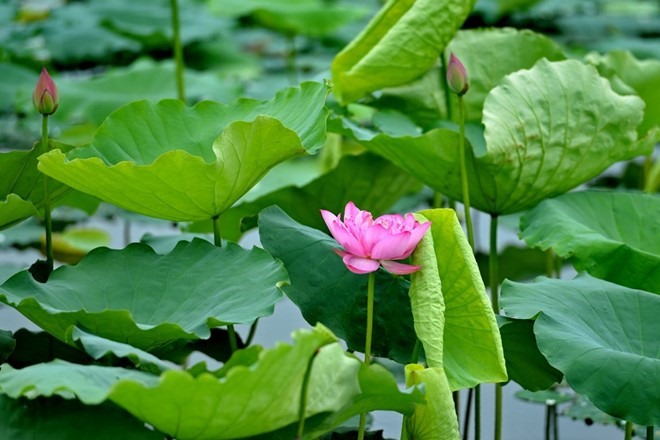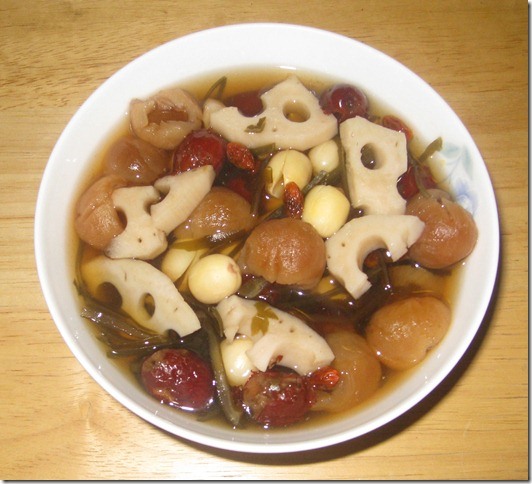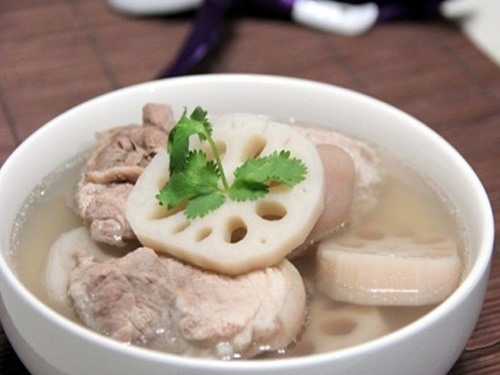 Life & Style
Life & Style

The Vietnamese revere lotus for its natural beauty, as well as for its nutritious and medicinal properties. Every part of the lotus can be used to cook nourishing dishes and to make herbal medicines to treat many ailments.
 |
| Lotus medicine: Lotus leaves are a Vietnamese folk medicine used to treat many ailments, including high cholesterol and triglycerides. |
By Hà Nguyễn
The Vietnamese revere lotus for its natural beauty, as well as for its nutritious and medicinal properties. Every part of the lotus can be used to cook nourishing dishes and to make herbal medicines to treat many ailments.
Canh củ sen hầm giò heo (Lotus root soup stewed with pig’s feet) and lotus leaves are perennial favourites.
Lotus root soup is a traditional dish eaten daily by locals. It is also enjoyed at parties, weddings and during the Tết holiday. The dish is available at restaurants in all three regions of Viet Nam.
Nguyễn Thị Hòa, 69, often cooks lotus root soup on weekends and during Tết. She enjoys making the dish for her two daughters-in-law when they are pregnant because it is very good for their health and for babies in the womb. Eating lotus root soup also ensures plenty of breast milk for nursing mothers after giving birth.
There are several ways to cook the dish but the most popular one is to stew lotus roots with pig’s feet.
“I often wake up very early in the morning to go to the market to buy fresh pig’s feet and lotus roots to cook the dish. The best quality roots are often from Hồ Tây (West Lake),” said Hòa.
The dish should be stewed over light fire for 20 minutes.
“All of my family members like lotus soup for its sweet broth, nutty lotus roots and soft, tasty pig’s feet. My 75 year old husband likes it very much because it is such a good food for him to sip with a cup of wine,” Hòa says.
Culinary expert Phan Tôn Tịnh Hải said housewives in Hà Nội and Huế cook dishes with lotus roots very well compared to those in other provinces and cities. This is because Hà Nội and Huế were focal points where many cooks originally learned from imperial dynasties how to cook the dish.
Professor, Dr Đỗ Tất Lợi, an herbal researcher, said lotus root helps eliminate toxins from the body and cools body heat. It is very nutritious for sick patients and pregnant women
Meanwhile, Chinese people often enjoy lotus root soup cooked with seaweed at new year, accompanied by a wish for all family members to live in a peaceful atmosphere year round, according to Lợi’s research.
There are cooking courses to teach people to make dishes from lotus roots in Việt Nam and in the region, including Japan, where Iwakuni city trains women to cook food made from lotus seeds.
The Japanese consider the lotus root lucky because they see brighter light and a promising future through the holes inside the root, Lợi said.
Koreans consider the lotus root a symbol of reproduction and development, so the dish is often present at their daily meals, he said.
Dr Trịnh Xuân Trường, of the Nam Á Traditional Medicine Hospital in Hà Nội, said lotus roots stop bleeding, have diuretic properties, fortify the kidneys, have tranquillising effects and promote beautiful skin.
Lotus leaves
In the past, fresh and dried lotus leaves were popular traditional herbs to treat many ailments, such as sunstroke, stomach ache and diarrhea, said Trường.
These days, researchers have discovered lotus leaf preparations help people lose weight and lower high blood pressure, cholesterol and triglycerides.
Herbal researcher Võ Văn Chi says elders with atherosclerosis and a history of cerebral hommorrhaging should drink lotus leaf tea.
Tuệ Tĩnh (1330-1400), a renowned herbalist of the Trần Dynasty, said in his book titled Nam Dược Thần Hiệu (Marvelous Effective Herbs of Việt Nam): “Lotus leaves, with their bitter flavour and nonpoisonous nature, help to reduce stresses and treat women’s pregnancy and obstetrics, scabies and stomach ache very effectively.”
Patient Tô Minh Cường, who suffered from both high cholesterol and triglycerides for several years, said his symptoms were greatly reduced after drinking lotus leaves daily.
Tạ Ngọc Thọ, 65, dealt with insomnia for years. He drank many sorts of medicines, without benefit. He was very weak and tired after years of insufficient sleep. But his insomnia was cured when he started drinking lotus leaf tea a year ago.
“I’m healthy again. Now I’m trying to introduce lotus leaves to many of my friends who face ailments similar to mine,” Thọ said.
But Associate Professor, Dr Nguyễn Duy Thuần of the Việt Nam Hospital of Traditional Medicine warns that only 15-20 grammes of dried lotus leaves should be used per day. Overdosing on lotus leaf preparations may damage the heart and weaken heart function. — VNS
 |
| Local specialty: Lotus roots may also be used to cook various dishes using different ingredients. |
 |
| Crowd pleaser: Pig’s leg stew with is a popular and nutritious Vietnamese dish. Photos monngonvietnam.com |




